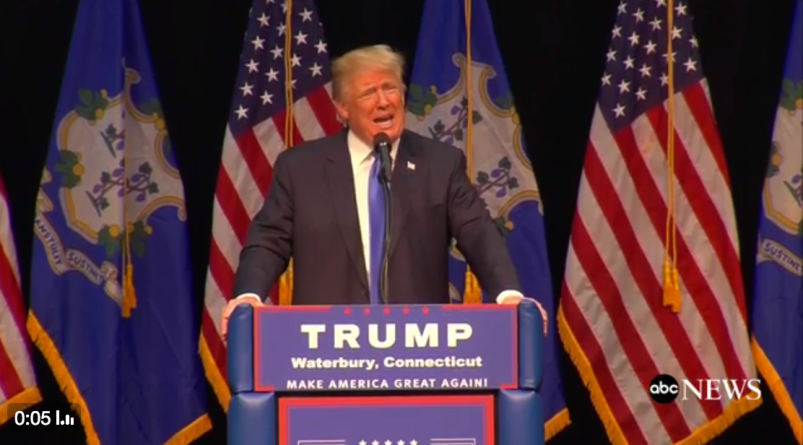Much of what Donald Trump says is bluster and demagoguery designed to win over a Republican primary audience. He often contradicts himself. And who knows what he would really do if he were elected president – I wouldn’t want to take the chance to find out. But there is sometimes a hint, or sometimes even the presence of, an arguable position in what he saying. And it’s important to understand this because it means that in some cases, Trump’s voters and the voters for Democrats share certain reasonable positions that have generally been taboo among Republicans.
That was the case with the underlying theme of restraint in his foreign policy speech last week and is also the case with the interview that Fortune did with him about his economic views.
I have to give economist Narayana Kocherlakota credit for pointing this out. In his excellent column, Kocherlakota accuses Trump of “making sense,” and he’s right.
When Fortune asks Trump about his ridiculous plan to pay off the country’s debt in 10 years (Trump actually said eight years to the Washington Post), Trump denies that he said it, and begins backing off from any commitment to eliminate the debt. “You could pay off a percentage of it,” Trump finally responds. But when Fortune asks him “what percentage?” he changes the subject. And that’s when things get interesting.
“It depends on how aggressive you want to be. I’d rather not be so aggressive. Don’t forget: We have to rebuild the infrastructure of our country. We have to rebuild our military, which is being decimated by bad decisions. We have to do a lot of things. We have to reduce our debt, and the best thing we have going now is that interest rates are so low that lots of good things can be done that aren’t being done, amazingly.” In other words, Trump wants to spend on infrastructure. He doesn’t really care about eliminating the debt. That’s Republican campaign talk.
Fortune than asks him whether he differs from other Republicans who favor raising interest rates. “I always like low interest rates, certainly as a developer. The problem with low interest rates is it’s unfair that people who’ve led the American way of life—the true American way of life—that have saved every penny, that have paid off their mortgages, that have done everything they were supposed to do, and they were going to retire with their beautiful nest egg, and they were going to get interest on their money, and now they’re getting one-eighth of one percent. I think that’s unfair to those people, who have led their lives in the way they were supposed to.”
Trump is describing a real problem with near-zero interest rates that affects savers and also municipal bonds, but when Fortune presses him, it’s clear what side he is on. “People think the Fed should be raising rates. What’s a scary prospect is if you start raising rates and you have to borrow money as a country, and if the rates, instead of where they are now, the rates are substantially higher, where the rates are 3 percent and 4 percent, or whatever it may end up being. That is a very scary prospect for this country. When you start adding that kind of number to an already reasonably crippled economy, certainly in terms of what we produce, that number is a very scary number for a lot of people to be looking at.” In other words, Trump favors keeping interest rates low.
So there’s some of the usual BS and politicking: we have to pay off the debt: we have to rebuild our military. Later he also does his number on the China trade which assumes China’s currency is still grossly undervalued. But what comes through in this one part on the Fed and interest rates is a position that is not that different from, say, Hillary Clinton and is diametrically opposed to most Republicans who want to raise interest rates and cut government spending or from Ted Cruz who wants to back on the gold standard and abolish the Internal Revenue Service. Trump wants to spend a lot of money on infrastructure, and he wants to keep interest rates low. That’s a position that is closer to Democrats than Republicans.






